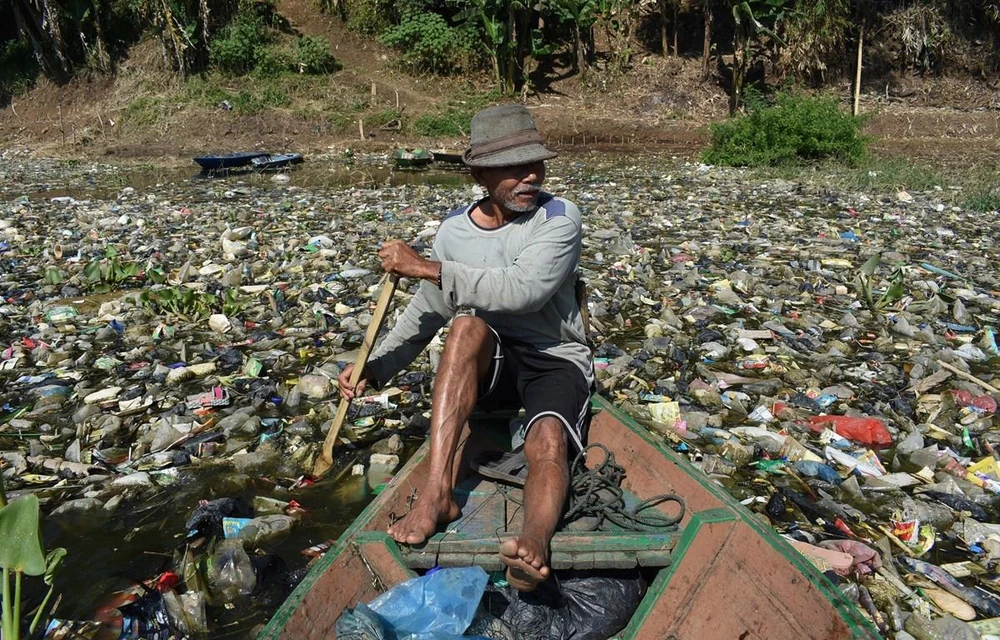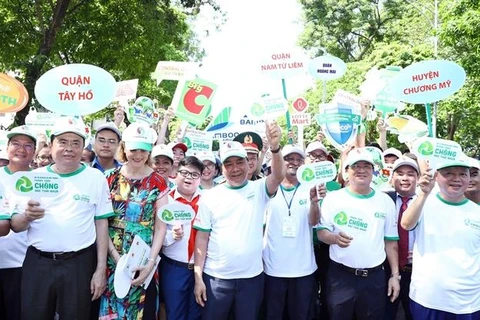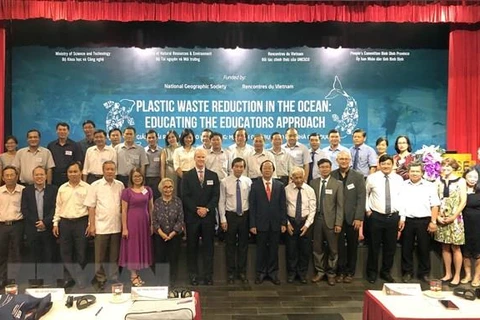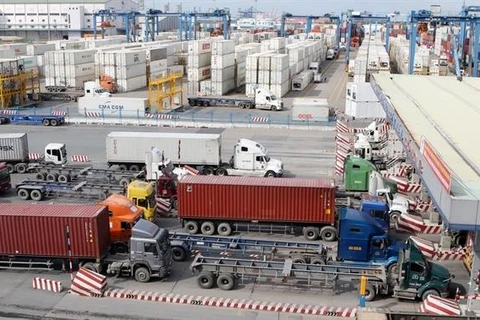
Hanoi (VNA) – Taxing end-users of plastic bags is deemed as a foray to bringing down the amount of daily plastic waste, according to Deputy Minister of Natural Resources and Environment Vo Tuan Nhan.
Currently, the highest tax rate for single-use plastic bags is 50,000 VND (USD) per kilo, and “the level is not enough” as there is no behaviour change, Nhan said at a discussion held in Hanoi on November 14.
Vietnam in war against plastic waste
Like many countries in the world, Vietnam is facing formidable challenges from climate change and environmental pollution during development process, with plastic waste being thrust at alert level that has crept up on the nation for years.
As the persistent policy of the Vietnamese Government is to develop the economy in tandem with protecting the environment, it is working to complete policies towards making the economy go circular, Nhan stressed.
The Ministry of Environment and Natural Resources (MoNRE) estimated that each Vietnamese family consumes five to seven plastic bags each day because they are both convenient and cheap.
It comes to mounting concern that more than 1.8 million tonnes of plastic garbage are discharged into the environment each year; however, only 27 percent is recycled. Vietnam is at high risk of becoming the global landfill with the amount of plastic trash surging 200 percent in the past year.
Meanwhile, Vietnam’s plastic consumption per capita is the third highest in Southeast Asia after increasing more than ten-fold in the last three decade. Each Vietnamese consumed only 3.8 kg of plastic in 1990, but 28 years later this had risen to 41.3 kg, according to a report released by Ipsos Business Consulting, a global growth strategy consulting firm based in Paris.
To this end, “If plastic waste is not well controlled, the country’s public health, sustainable development, and even prestige in the international arena will be critically affected. A robust economic growth could not compensate for them”, Nhan voiced his concern.
According to expert Trinh Kim Chi from the Vietnam Association of Conservation of Nature and Environment, there are many limitations in collecting, classifying and recycling single-use plastic products Vietnam.
“Normally, plastic items can take up to hundreds of years to decompose in landfills, and their existence will affect the quality of both land and water”, she said.
Plastic waste is really a hot potato in big cities like Hanoi that discards some 5,000 tonnes of trash with 5-8 percent of the amount being plastic bags, and Ho Chi Minh City that throws millions of plastic carriers into the environment every day.
“If public awareness of the harmful effects of plastic bags is not raised, not only we but also our descendants will suffer critical consequences”, she added.
Concerted efforts needed
Deputy Minister Nhan laid stress on the necessity to promote communication work, urging local people cut down the use of non-disposable plastic bags. This will be followed by a ban on undegradable plastic products and single-use plastic carriers.
“When the ban takes effect, enterprises need to find alternative measures”, he said.
The Government is working with foreign embassies and global development funds to set up a centre responding to ocean plastic waste, as well as joining hands with competent religious and socio-political organisations to carry out communication campaigns to change consumer behaviour.
Nhan suggested the Government encourage local firms produce environmentally-friendly products, and particularly levy latte taxes on plastic product users and facilities that discharge hard-to-decompose plastic.
Meanwhile, it is necessary to reduce tax burden on firms that make eco-friendly products, he stressed.
Vietnam is one of Asia’s five worst polluters of ocean plastic waste, according to international organisations. With 13 million tonnes of waste released to the ocean every year, the country ranks 17th in the world for ocean plastic waste pollution.
Although there are no official statistics on the amount and varieties of plastic in the Vietnamese sea and islands, plastic waste is easy to see in Vietnamese waters, with the country’s 112 estuaries the main gateways of plastic to the ocean.
On the positive side, Vietnam has taken efforts to manage imported plastic scraps and monitor plastic production and consumption.
Director General of the sea and islands administration Ta Dinh Thi said in 2018, Vietnam proposed Partnerships in Environmental Management for the Seas of East Asia and launched initiatives to foster global cooperation in plastic waste reduction.
A campaign launched by MoNRE last year delivers the message that single actions are not enough to address plastic pollution but a series of actions like plastic recycling, saying no to single-use plastic products and seeking alternative energy solutions can help./.
























